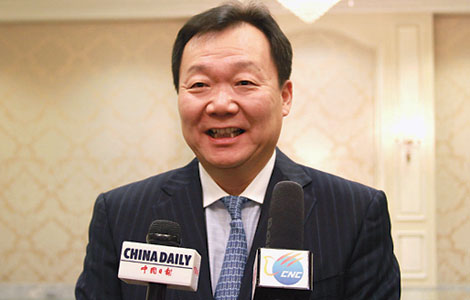Apple CEO apologizes in letter
Updated: 2013-04-02 10:54
By Yu Wei and Liu Baijiain New York (China Daily)
|
||||||||
Apple Inc has issued a letter signed by CEO Tim Cook apologizing to Chinese consumers and announcing changes to several product-warranty terms in the wake of criticism from Chinese authorities, media and the public in recent weeks.
In the letter, posted to Apple's Chinese-language website on Monday, Cook said he wanted to express "sincere apologies" for any misunderstandings caused by poor communication from the Cupertino, California, electronics company to customers in its second-biggest market.
"We are aware that because of a lack of communication, some parties have seen Apple as arrogant or inattentive, or that it doesn't care or attach enough importance to consumer feedback," he wrote in the letter. "We express our sincere apologies for any concerns or misunderstandings this gave consumers."
The company's public-relations problem hit its peak on March 15, which is World Right Day, when China Central Television reported that some of Apple's consumer policies discriminated against customers in China.
CCTV interviewed several people who complained that while Apple would replace a damaged iPhone for a qualified consumer in the United States or another country, Chinese customers had to use the back cover from their old iPhone or buy a new cover. Other people said Apple offered only one-year warranties on the mainboard of its MacBook Air notebooks, even though Chinese consumer laws require computer makers to provide two-year protection for such components.
A day after the program aired, Apple issued a statement saying it was committed to providing world-class products and services without directly addressing the Chinese accusations.
The following week, on March 23, the company put out a second statement. It said there was no major difference between Apple's policies in China and other parts of the world and that Chinese consumers enjoy the highest standard of service, like Apple customers everywhere.
Critics, however, found the second statement self-serving.
The People's Daily, the largest daily newspaper in China, published editorials and reports for several days afterward that, among other things, accused Apple of being "arrogant" in failing to respond to Chinese consumers. Xinhua News Agency carried similarly critical stories and commentary.
Last week, two Chinese government agencies tasked with protecting consumers' rights and industrial standards urged the US tech giant to revise its warranty policies to conform to Chinese law. The agencies also told local subordinate bodies nationwide to increase scrutiny of Apple products and consumer practices.
According to the company's latest statement, Apple then reviewed feedback regarding its service and warranty policies, consulted relevant government agencies about laws and rules, reviewed its communication procedures and worked to "streamline" customer-feedback processes with its authorized service providers in China. Cook also said the company would further train its authorized resellers on Apple's warranty policies and clearly post these online.
Anna Han, a professor at Santa Clara University School of Law in California, said many multinationals that enter China don't succeed because they try to copy practices from their home market, which can leave them in breach of domestic laws.
"However, in the case of Apple, there seems to have been more of a public-relations issue, where the warranties were slightly different in China from its US warranties," she said.
Although Apple has the vast majority of its products made in China, it's likely that growth in that market has outpaced the company's ability "to put in place the necessary customer-service infrastructure", said Jason Dedrick, who teaches in Syracuse University's School of Information Studies.
In the US, Apple operates a nationwide network of retail stores to provide service to customer concerns. But China has only a few Apple stores, and third-party vendors render most customer service.
Multinational companies, Dedrick said, often face difficulties in adjusting to, and complying with, local regulations and customs. In a market as huge as Apple's is in China, the risk from compliance lapses can be significant.
"One lesson is that it often is better to go slower and build the necessary relationships, infrastructure and understanding of a new market before going all-out to build market share," he said.
China is Apple's second-biggest market, after the US. The company's Chinese sales last year totaled $23.8 billion, which was 15 percent of total worldwide revenue.
Citigroup Inc analyst Glen Yeung said that if the negative publicity led to a reduction of half of Apple's market share in China, as happened to US-based Hewlett-Packard Co after a recall of notebook computers in 2010, the cost to Apple could be as high as $13.1 billion.
Apple's stocks closed on Monday at $428.91, down 3 percent.
Most analysts expect any damage Apple suffers in China will be minor.
Van Baker, research vice-president of mobility with US technology consulting firm Gartner Inc, said that if Apple "adequately" addresses consumer complaints in China, the impact should be minimal, given CEO Cook's letter of apology and promises of revised practices.
Contact the writers at yuwei12@chinadailyusa.com and liubaijia@chinadailyusa.com











